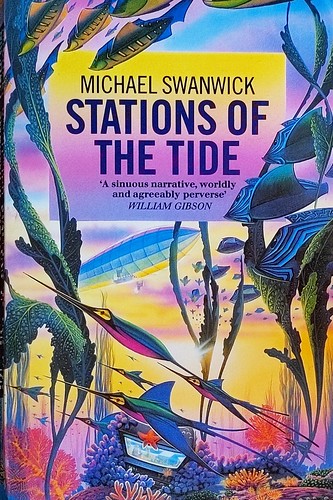
By
Michael Swanwick (who also wrote the promising but ultimately disappointing
The Iron Dragon's Daughter, as well as the best forgotten
Bones of the Earth).
As usual, there isn't much to be said without revealing the plot, so the key take-home messages are:
* both are excellent,
* I've read them before and I'll read them again,
* they've got new ideas and new thoughts in them.
They're both, rather vaguely, set in the same universe. But I can't really tell you more about that until I talk about the plot. So if you haven't already read them, I advise you to stop here and go read them.
The Plot
VF sets the scene for SOTT. But I read SOTT first. There's a scene - somewhat towards the end of SOTT, as the Bureaucrat starts to unravel the mystery - where he talks to Earth's Avatar in the Miranda system. Its a delight, and I found it powerful and memorable. But it won't make much sense unless you've read VF.
Umm, actually, I find that I don't really want to tell you the plot. What would be the point? If you've read it, you know it, and if you haven't, you don't, and a potted summary really won't help you. Let talk, instead, about...
The Ideas
So, like I say, they're linked, but it only matters a bit. In the first book, Rebel Elizabeth Mudlark is questing the solar system trying to work out who she is, and ends up at Earth, talking to Earth aka the Comprise, which is now a hive mind (there's a slightly implausible explanation of why Earth is confined to the Earth, except for a few who those who live in space let out; given the tech Earth has, I think it would be trivial for it to sweep them away; but no matter, it suits the book. And there's a partial explanation of this anyway, which is that Earth needs Integrity).
So Earth has tech (transit rings, but not FTL), but the Dyson-tree folk of the Oort cloud have biotech, in particular mindtech, and Earth wants Integrity, which will allow it to glob off lumps of itself and send them starwards, and not have them fall apart into not-Earth2. And it turns out that a Wizard of the cloud has sent REM in, as a cross between a finger of herself and a sale item; and that although wetware reprogramming is commonplace, her personality is resilient, due to said Integrity.
In the end, a bargain is struck, and Earth gets Integrity in exchange for Tech; both sides get the stars, if I recall correctly. The armless child representing Earth is a nice touch; vulnerability.

Cut, to
Back at Stations of the Tide, things move at a gentler pace. The first scene is set on an airship (how people love airships!) and the magician makes his mysterious appearance1 - and disappearance - and the theme of magic, or rather not really magic (I have to say that, rather than "of course", because this is scifi; but its scifi not fantasy: there is no "true magic") but the ability of people to convince others of magic. SOTT is a darker book than VF.
And here too the theme of integrity comes back, in the need to be grounded in reality, and the way people can be fooled into destroying themselves. How well would you survive under the onslaught of such magic? I'm not describing this well: really, read the book.
The ending is good - unlike so many other books, there really is an ending, with (many bonus points, since this is scifi) a gloriously humourous bit when then Bureaucrat finally tells his briefcase for the third time to construct some illegal tech.
And I haven't even told you about the trip to the edge to meet Earth. Its well done, and the bits that can be done are well sketched in without breaking the other bits. In this kind of stuff, that's a lot of the skill.
2021
I've re-read Vacuum Flowers and enjoyed it again. What jars a little perhaps - now the shock of the story has worn off - is the implausibility of the chain of events taking REM to Earth. And I notice the similarities in style to Neuromancer. But, still good. Still excellent? I'd certainly recommend it over an awful lot of other stuff.
And now SOTT. Again, good. But holes begin to open up: just why did Gregorian want to be chased? It isn't clear. There's a faint explanation at the end, but it was not terribly plausible and I instantly forgot it. There's also - I'm tempted to call it crude, but I've only just noticed it, so maybe it isn't - an unpleasant feature: the Bureaucrat is pushed around by all these worldly-wise magicians of the Tidewater, but has the last laugh: he not only has higher tech, he can actually do the things they merely pretend to. Isn't this a bit revenge-of-the-nerds type stuff? Trivia: the "tsunami" from melting ice caps would not of course be any such thing: it would be gradual. And I find the long-seasonal dimorphism implausible, just as it was in
Helliconia: I doubt evolution can do that.
Notes
1. (Added 2021): in fact this isn't the magician. Also note that the magicians of SOTT are not the same sort of magicians as VF: they are manipulators of people's minds, somewhat in the manner of our stage magicians; not people skilled at manipulating actual reality.
2. Which when you think about it is very much the same "society shall not decay" that Plato wants and that Popper criticises him for.

